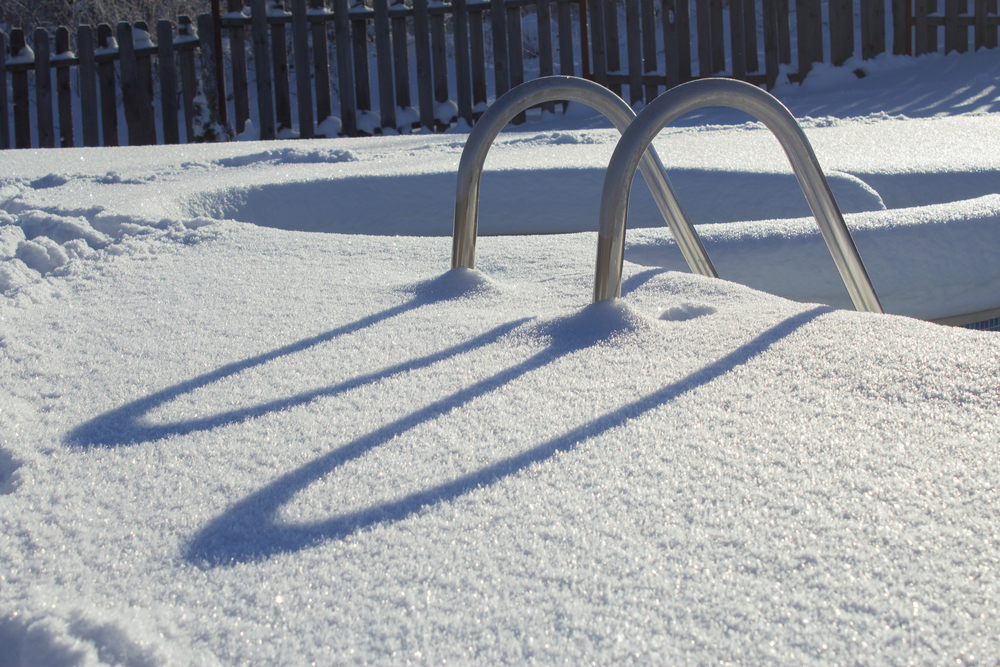
One of the perks of living in Texas is our weather. We’re lucky to have such a long season for swimming. But when cooler temps roll in, you’re probably thinking it’s time to close that pool and move into the hot tub. Before you take that soak, let’s talk about how to winterize a pool in Texas.
Why You Should Winterize Your Swimming Pool
Proper winterization is essential to pool maintenance. It extends the life of your pool and saves you money in the long run. During the summer season, you’re constantly cleaning out debris and monitoring your pool’s chemistry to keep it crystal clear. Don’t abandon it in the winter! Ditching your pool won’t only make more work for you next year. It could result in serious damage to your pool and its filtration system. Rotting leaves, bugs, and twigs will slowly settle and clog up drains and skimmers. And decaying debris will throw your pool’s pH levels out of whack.
When to Winterize a Pool in Texas
Timing is key. Lower temperatures help control algae growth. Keep your pool clean, tested, and balanced right up until the 65-degree days are over for the season. You’ll be grateful when it’s time to swim again, and it takes fewer chemicals to open your pool back up! Most of Texas doesn’t deal with freezing temperatures for long. Houston and Austin often only see temps below 32F about 11 nights out of the year. And in Dallas/Fort Worth, we only see twice that. But don’t risk it! Just one night of ice buildup can damage your pool.
Steps For Winterizing an In-Ground Pool
Your in-ground pool is designed to last for decades with proper maintenance. But ice expansion can damage your pool’s plaster or vinyl lining, as well as your filtration, pump, and skimmer.
Follow the steps below to make sure your pools is ready for the winter months.
Step 1: Clean the Pool
Brush and vacuum your pool thoroughly. Clear out all dirt, leaves, and debris. Remove all pool accessories and pool toys.
Step 2: Test the Water
Check alkalinity, pH, calcium, and chlorine. Stabilizing your water chemistry will help your pool last the off-season. If you’re unsure about the levels, a pool supply or service company can help.
Step 3: Add Winterizing Chemicals
You’ll want to add a pool shock, winter algaecide, stain & scale preventer, and a slow-release floater with oxidizers.
Step 4: Lower the Water Level
Lower the water level to a few inches under the skimmer. If you’re using a pool safety cover instead of a winter pool cover, don’t lower the water more than 18” from the top of the pool.
Step 5: Clean the Filtration System and Pump
Don’t leave debris in your pool’s systems all winter. You’ll come back to a gunky mess!
Step 6: Clear the Lines
Blow out the lines with a blower, shop vac, or air compressor. If you have a pool heater, make sure it’s dried out too.
Step 7: Install a Winter Cover
Keep debris out! If your cover uses water bags, only fill them up about 75%, so they don’t break if they freeze.
Winterize Your Texas Pool Before It’s Too Late
Keep your pool and pool equipment trouble-free all year. If you want your Texas pool to last, you need to winterize it properly. Not only will you protect it, but you’ll also make your life easier in the spring.
Not ready to winterize a pool on your own? Gold Medal Pools is here to help! Contact us today for maintenance and service. We service all pools and pool equipment brands!




